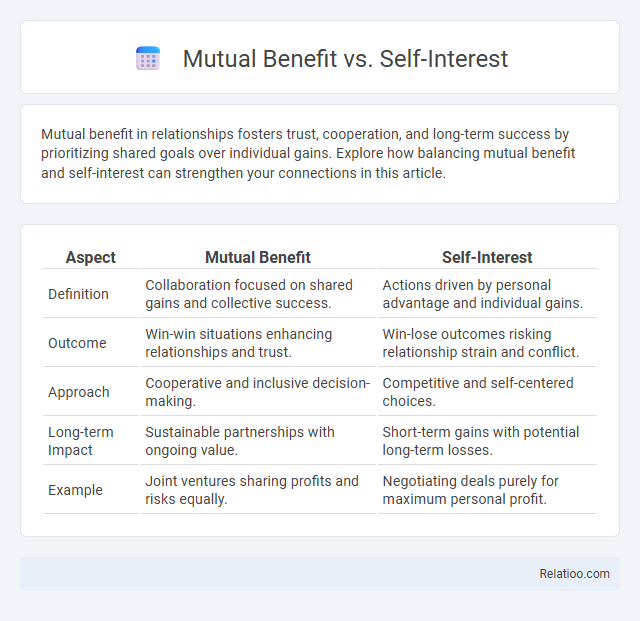Mutual benefit in relationships fosters trust, cooperation, and long-term success by prioritizing shared goals over individual gains. Explore how balancing mutual benefit and self-interest can strengthen your connections in this article.
Table of Comparison
| Aspect | Mutual Benefit | Self-Interest |
|---|---|---|
| Definition | Collaboration focused on shared gains and collective success. | Actions driven by personal advantage and individual gains. |
| Outcome | Win-win situations enhancing relationships and trust. | Win-lose outcomes risking relationship strain and conflict. |
| Approach | Cooperative and inclusive decision-making. | Competitive and self-centered choices. |
| Long-term Impact | Sustainable partnerships with ongoing value. | Short-term gains with potential long-term losses. |
| Example | Joint ventures sharing profits and risks equally. | Negotiating deals purely for maximum personal profit. |
Understanding Mutual Benefit: A Core Principle
Mutual benefit is a core principle emphasizing outcomes where all parties gain value, fostering trust and long-term cooperation. Understanding this concept helps you prioritize shared goals over individual self-interest, leading to more sustainable and productive relationships. Synergy occurs when combined efforts create greater results than isolated actions, reinforcing the importance of mutual benefit in collaborative environments.
The Nature of Self-Interest in Human Behavior
Self-interest in human behavior drives individuals to prioritize their own needs and goals, shaping decision-making processes based on personal gain or survival. This intrinsic motivation often conflicts with mutual benefit, which requires cooperation and shared advantages, while synergy emerges when combined efforts create outcomes greater than individual contributions. Understanding self-interest is essential for fostering effective collaboration and designing systems that balance personal motives with collective success.
Historical Perspectives: Mutual Benefit vs Self-Interest
Historical perspectives on mutual benefit and self-interest reveal contrasting views on human motivation and social cooperation. Classical economists like Adam Smith emphasized self-interest as the primary driver of economic activity, arguing that individual pursuits unintentionally promote societal welfare through the "invisible hand." In contrast, early social theorists such as Aristotle and later cooperative movements highlighted mutual benefit as essential for ethical communal living and long-term social stability.
Psychological Foundations of Cooperation
Mutual benefit, self-interest, and synergy represent key psychological foundations of cooperation rooted in social exchange theory and evolutionary biology. Individuals often engage in cooperative behavior when the perceived rewards of mutual benefit align with personal self-interest, fostering trust and long-term collaboration. Synergy emerges when cooperation generates outcomes surpassing individual contributions, driven by shared goals, reciprocal altruism, and collective efficacy.
Economic Impact: Win-Win vs Win-Lose Strategies
Mutual benefit strategies promote economic growth by creating win-win outcomes where all parties experience gains, increasing overall productivity and wealth distribution. Self-interest approaches often lead to win-lose scenarios, causing resource inefficiencies and potential market failures due to competitive behaviors that prioritize individual gains over collective welfare. Your focus on synergy emphasizes collaborative efforts that leverage combined strengths, enhancing innovation and sustainable economic impact beyond zero-sum competition.
Mutual Benefit in Business Practices
Mutual benefit in business practices emphasizes creating value that advantages all parties involved, fostering long-term relationships and trust between stakeholders. This approach contrasts with self-interest, which prioritizes individual gain often at the expense of others, potentially undermining collaboration and sustainability. Synergy, while related, focuses on combined efforts producing outcomes greater than individual contributions, but mutual benefit ensures equitable value distribution that supports shared success.
Self-Interest and Ethical Dilemmas
Self-interest often drives decision-making but can lead to ethical dilemmas when personal gain conflicts with fairness or social responsibility. You must carefully evaluate how pursuing your own benefits impacts others to avoid compromising integrity or creating harm. Balancing self-interest with mutual benefit fosters synergy, where collaborative efforts generate greater value than isolated actions.
Social Interactions: Building Trust and Reciprocity
Mutual benefit in social interactions fosters trust by ensuring all parties gain value, while self-interest often limits cooperation to personal advantage, hindering long-term relationships. Synergy transcends individual gains, creating collective outcomes that exceed the sum of separate efforts, reinforcing reciprocity and deepening social bonds. Trust and reciprocity thrive when interactions prioritize combined success over singular ambitions, promoting sustainable and collaborative networks.
Case Studies: Mutual Benefit in Action
Case studies of mutual benefit highlight scenarios where both parties achieve shared value, contrasting with self-interest that prioritizes individual gains. Companies collaborating on sustainable supply chains demonstrate how synergy amplifies results beyond isolated efforts, benefiting all stakeholders involved. Your ability to identify and foster mutual benefit can transform competitive dynamics into cooperative success stories.
Striking the Balance: Integrating Mutual Benefit and Self-Interest
Striking the balance between mutual benefit and self-interest requires aligning individual goals with collective outcomes to foster sustainable collaboration. Integrating synergy involves leveraging diverse strengths while ensuring that personal incentives contribute to shared success, enhancing overall productivity and innovation. Effective strategies emphasize transparent communication, trust-building, and equitable value distribution to create environments where mutual benefit and self-interest coexist harmoniously.

Infographic: Mutual Benefit vs Self-Interest
 relatioo.com
relatioo.com